Demolition Contractors Miami
Best Demolition Contractor in Miami
Receive multiple Demolition Companies quotes for your project today! Compare profiles, reviews, accreditations, portfolio, etc... and choose the best service.
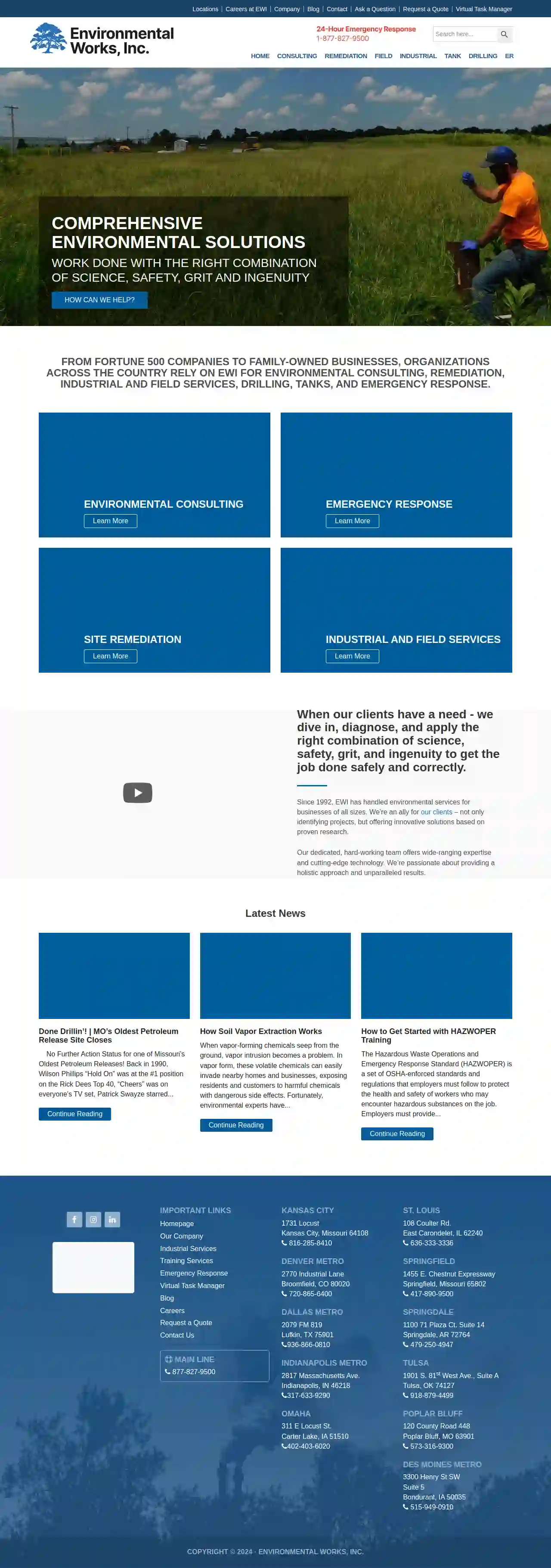
Environmental Works
3.17 reviews1000 N. 10th Street, St. Louis, USEnvironmental Works, Inc. Comprehensive Environmental Solutions Work done with the right combination of science, safety, grit and ingenuity From Fortune 500 companies to family-owned businesses, organizations across the country rely on EWI for environmental consulting, remediation, industrial and field services, drilling, tanks, and emergency response.
- Services
- Why Us?
- Accreditations
- Gallery
Get Quote
Iron Kross Dirt Work Designs
4.110 reviewsTulsa, USIron Kross Dirtwork Designs: Your Trusted Excavation Partner in Tulsa and Beyond Iron Kross Dirtwork Designs is a family-owned business with over 18 years of experience in providing top-notch excavation services for both residential and commercial projects in Tulsa and surrounding areas. We are fully licensed, bonded, and insured, ensuring peace of mind for our clients. Our commitment to quality, professionalism, and customer satisfaction sets us apart. We specialize in a wide range of excavation services, including: Dirtwork Demolition Sewer repair Water and sewer line replacement Land clearing Tree clearing And much more! Our team of experienced and skilled technicians is dedicated to delivering exceptional results on every project. We utilize cutting-edge technology and state-of-the-art equipment to ensure minimal damage and efficient completion. We are committed to clear communication throughout the project, keeping you informed every step of the way. Whether you need a simple landscaping project or a large-scale commercial excavation, Iron Kross Dirtwork Designs is your trusted partner. We are available 24/7 for emergency services, ensuring prompt and reliable assistance when you need it most. Contact us today for a free quote and let us help you bring your vision to life!
- Services
- Why Us?
- Gallery
Get Quote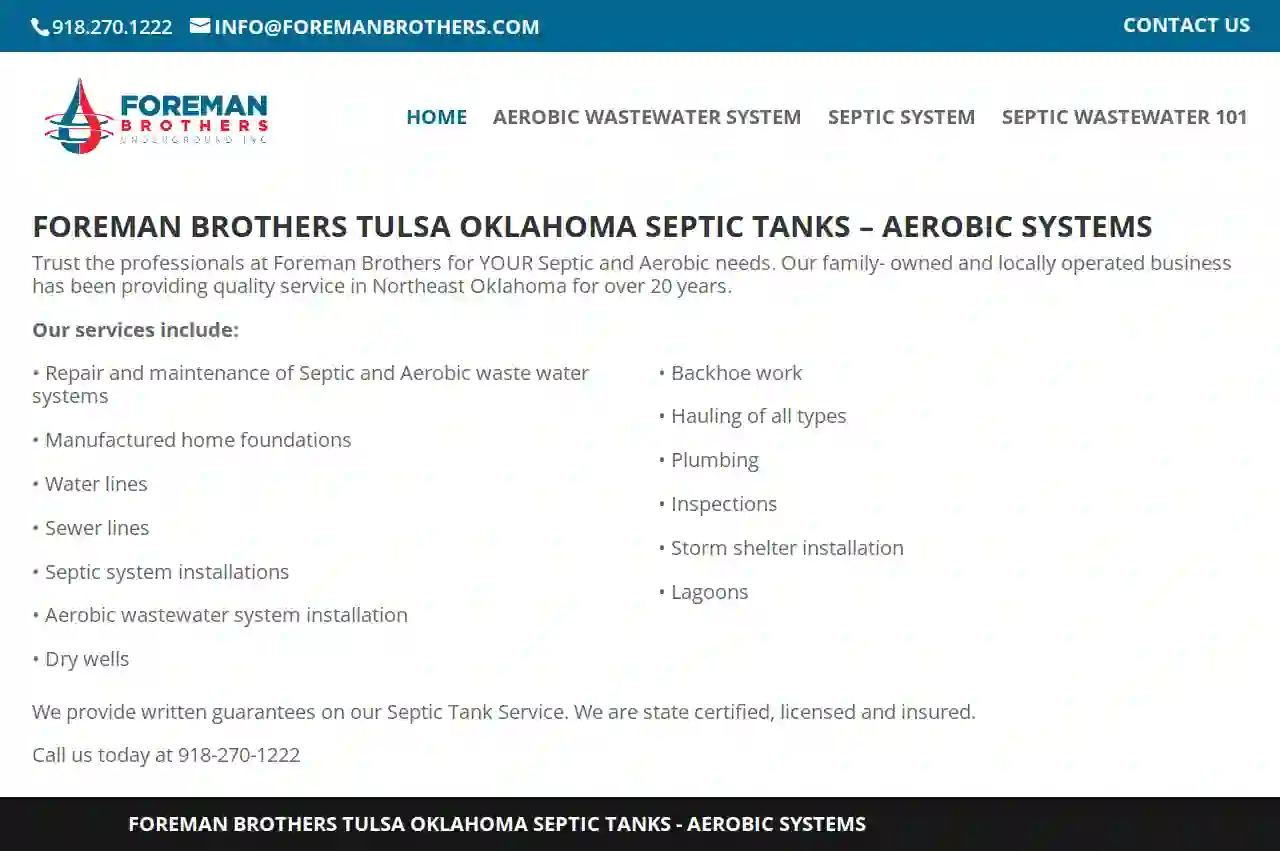
Foreman Brothers Underground
32 reviewsTulsa, USForeman Brothers: Your Trusted Septic and Aerobic Experts in Northeast Oklahoma Foreman Brothers is a family-owned and locally operated business with over 20 years of experience serving the Northeast Oklahoma area. We are dedicated to providing high-quality service for all your septic and aerobic wastewater system needs. Our team of experienced professionals is committed to delivering reliable and efficient solutions, ensuring your peace of mind. We understand the importance of a properly functioning septic system, and we are here to help you maintain it. We offer a wide range of services, including: Repair and maintenance of Septic and Aerobic waste water systems Manufactured home foundations Water lines Sewer lines Septic system installations Aerobic wastewater system installation Dry wells Backhoe work Hauling of all types Plumbing Inspections Storm shelter installation Lagoons We are proud to provide written guarantees on our Septic Tank Service, and we are state certified, licensed, and insured. Contact us today for a free consultation and let us help you with all your septic and aerobic needs.
- Services
- Why Us?
- Gallery
Get Quote
NC GROUNDWORKS
3401 N. Kerr Ave., Wilmington, 28405, USOur Story Horticulture has fascinated Marcy Hedgerow, James Duncan's founder, as long as she can remember. From the time she could toddle, she spent her time outdoors collecting "specialmens" (as she called them). As she got older, her interest in taxonomy grew into an obsession: she knew she'd found her life's calling. After receiving her PhD in horticulture from the University of Ann Arbor, she knew she couldn't spend her time in an office. Wanting to get her hands dirty once again, she started James Duncan, specializing in creating beautiful landscapes for the next generation of "specialmen" collectors. Our Mission From the Palace of Versailles to your doctor's office, landscaping is an important part of an establishment's visual impression. We believe it ought to be beautiful, thoughtful, and well done. Always.
- Services
- Why Us?
- Gallery
Get Quote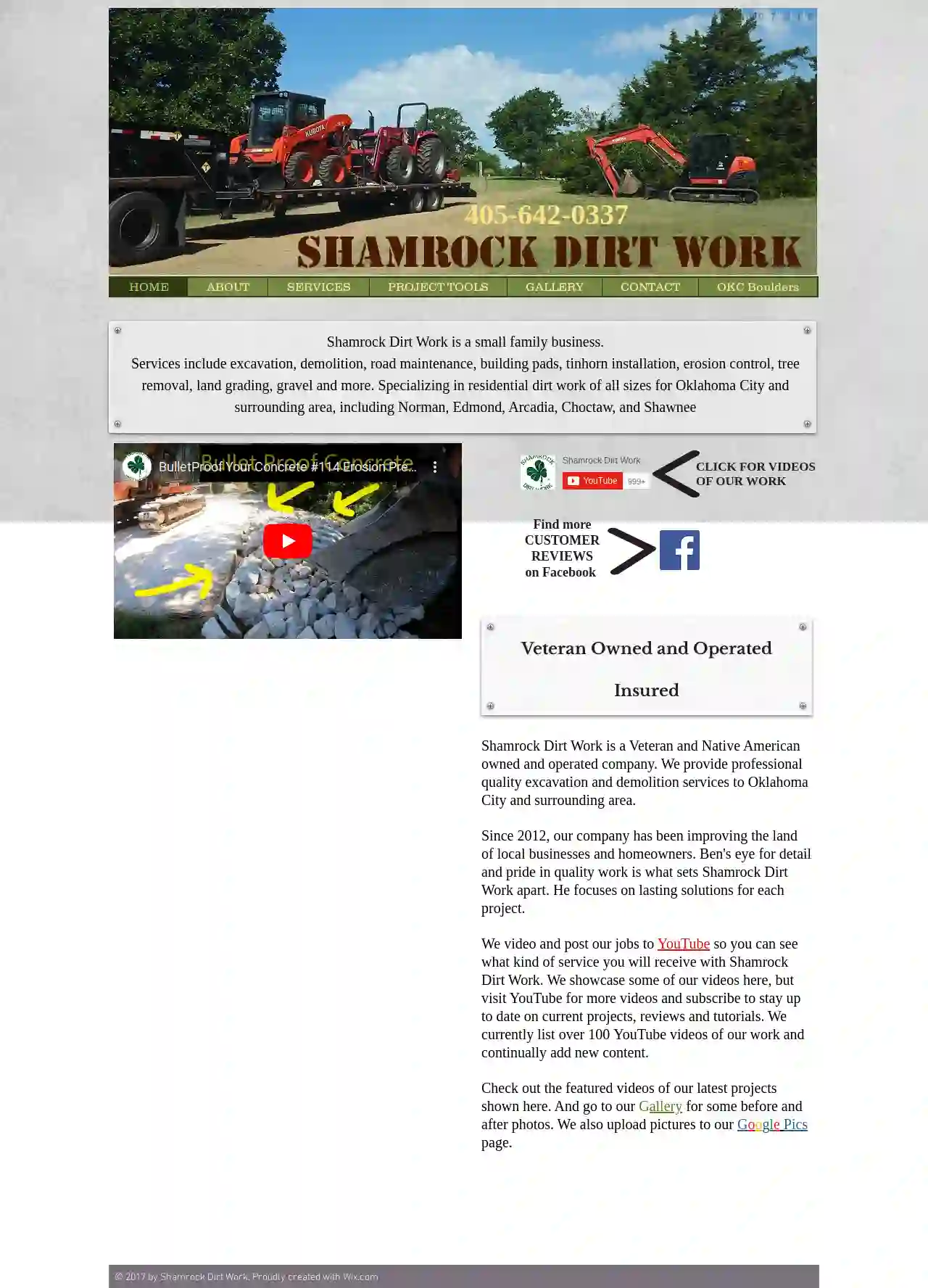
Shamrock Dirt Work
4.731 reviewsOklahoma City, USShamrock Dirt Work: Your Trusted Excavation Partner in Oklahoma City Shamrock Dirt Work is a family-owned and operated business dedicated to providing high-quality excavation and demolition services to Oklahoma City and the surrounding areas. We specialize in residential dirt work of all sizes, serving communities like Norman, Edmond, Arcadia, Choctaw, and Shawnee. Since 2012, we've been committed to improving the land for local businesses and homeowners. Our owner, Ben, brings a keen eye for detail and a dedication to quality work that sets us apart. He focuses on delivering lasting solutions for every project. We believe in transparency and showcasing our expertise. That's why we video and post our jobs on YouTube, giving you a clear picture of the service you can expect from Shamrock Dirt Work. Explore our YouTube channel for a wide range of videos, including project updates, reviews, and tutorials. We currently have over 100 videos showcasing our work and are constantly adding new content. Ready to see the difference Shamrock Dirt Work can make? Check out our featured videos showcasing our latest projects. For a visual before-and-after experience, visit our Gallery. We also share photos on our Google Pics page.
- Services
- Why Us?
- Gallery
Get Quote
Flintco LLC
4.110 reviewsTulsa, USUnwavering Pursuit of the Perfect Construction Experience Flintco is recognized for its commitment to Safety and Quality, using Lean principles as a guide to continuous improvement – the bedrock of our Ethos. What We Do We provide Construction Management services to clients in multiple markets, including Aviation, Commercial, Education, Healthcare, Hospitality, Government, Industrial, Interiors, and Sports. Flintco self-performs certain scopes of work, including concrete, steel erection and excavation among others. How We Do It After more than 100 years, Flintco continues to thrive because of our people, and their personal commitment to deliver the highest quality construction — safely. Innovations Flintco is committed to innovation and has developed several initiatives to improve the construction process, including: Flintco 4 LIFE: A safety program focused on the well-being of employees, trade partners, and clients. Virtual Design and Construction: An ecosystem of technology that enhances collaboration, improves accuracy, and delivers superior results. Lean2.0®: A uniquely Flintco approach to driving efficiency and value for clients, designers, and trade partners.
- Services
- Why Us?
- Gallery
Get Quote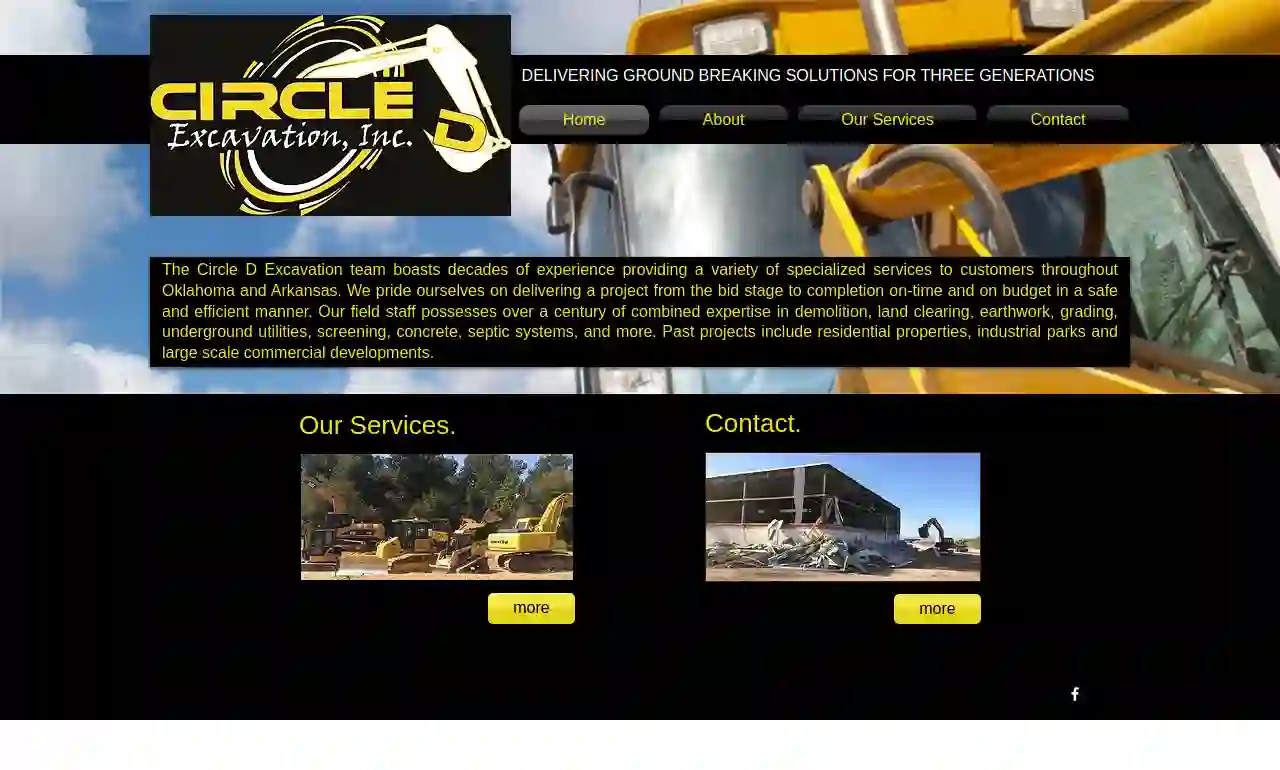
Circle D Construction & Excavation, LLC
53 reviewsTulsa, USDELIVERING GROUND BREAKING SOLUTIONS FOR THREE GENERATIONS The Circle D Excavation team boasts decades of experience providing a variety of specialized services to customers throughout Oklahoma and Arkansas. We pride ourselves on delivering a project from the bid stage to completion on-time and on budget in a safe and efficient manner. Our field staff possesses over a century of combined expertise in demolition, land clearing, earthwork, grading, underground utilities, screening, concrete, septic systems, and more. Past projects include residential properties, industrial parks and large scale commercial developments.
- Services
- Why Us?
- Gallery
Get Quote
Midwest Retaining Walls Inc.
49 reviewsTulsa, USAbout Midwest Retaining Walls Inc. Imagine stepping into your backyard and finding it transformed into a beautifully crafted landscape, perfectly tailored to enhance the enjoyment of your property. Welcome to Midwest Retaining Walls Inc, a licensed and insured contractor with over 25 years of expertise in building retaining walls. Family-owned and locally operated in Tulsa, OK, we take immense pride in transforming your outdoor space into a stunning scene. While we build walls, we craft the foundations for your dreams. At Midwest Retaining Walls Inc, we specialize in a variety of services that cater to our residential and commercial customers. Whether you're looking to enhance the utility of your space with a strategically placed retaining wall or you dream of a tranquil backyard oasis complete with a custom-designed koi pond, our team is equipped to make it happen. Our services include detailed excavation and effective drainage solutions, ensuring that every project delivers your vision and more. Our dedication to quality workmanship and exceptional customer service forms the cornerstone of our business philosophy. We believe in maintaining the highest level of professionalism in every project we complete. This commitment is evident in our comprehensive 10-year warranty on all installations and the attractive 30% discount we offer for referrals. Choosing us means investing in a service that values longevity and satisfaction. What sets us apart is our unique capability to deliver free-standing retaining walls and beautifully designed and installed koi ponds that serve as the centerpiece of any garden. Each project is approached with an eye for striking detail. Discover the distinct quality of Midwest Retaining Walls Inc in Tulsa, OK. Allow us to turn your dreams into reality and preserve the beauty of your environment. Reach out today for a complimentary estimate, and begin the journey to realize your vision. Our Services For expert retaining wall installation in Tulsa, OK, call Midwest Retaining Walls Inc at (918) 803-0053. Our experienced team specializes in crafting an outdoor experience complete with koi ponds, drainage and more! Retaining Wall Supplier Excavation Services Drainage Services Koi Ponds Builder Koi Ponds Design Koi Ponds Install Free Standing Retaining Walls
- Services
- Why Us?
- Gallery
Get Quote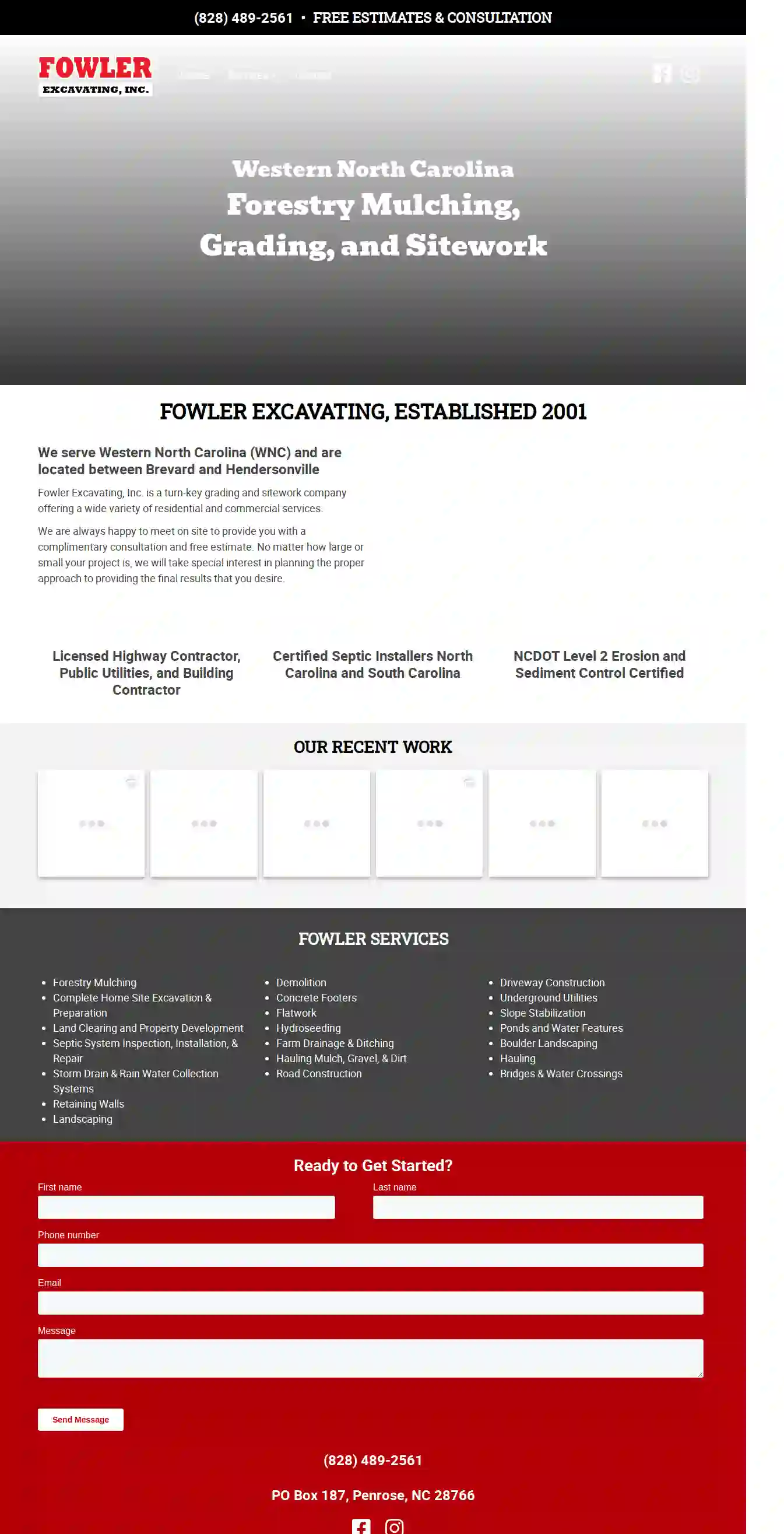
Fowler Excavating
52 reviewsPO Box 187, Penrose, 28766, USFowler Excavating, Established 2001 We serve Western North Carolina (WNC) and are located between Brevard and Hendersonville. Fowler Excavating, Inc. is a turn-key grading and sitework company offering a wide variety of residential and commercial services. We are always happy to meet on site to provide you with a complimentary consultation and free estimate. No matter how large or small your project is, we will take special interest in planning the proper approach to providing the final results that you desire. Licensed Highway Contractor, Public Utilities, and Building Contractor Certified Septic Installers North Carolina and South Carolina NCDOT Level 2 Erosion and Sediment Control Certified
- Services
- Why Us?
- Gallery
Get Quote
Work Horse Enterprises, LLC
52 reviewsTulsa, USWe Are Work Horse Enterprises Welcome to Work Horse Enterprises, where we redefine blue-collar excellence. As a proudly local and veteran-owned enterprise, we embody a steadfast commitment to quality and resilience in every project we undertake. With a proven track record of over 1,000 satisfied clients, our promise to deliver excellence remains unwavering. Choosing Work Horse means aligning with a partner who boldly stands out amidst industry conformity. Beyond mere project completion, we elevate each endeavor, transforming opportunities into demonstrations of unparalleled quality and reliability. At Work Horse Enterprises, we invite you to elevate your expectations and experience the difference of working with a team dedicated to exceeding every challenge with integrity and expertise. Choose bold, choose excellence, choose Work Horse. Prepared to Work, Committed to Excellence.
- Services
- Why Us?
- Gallery
Get Quote
Over 22,076+ Excavation Contractors registered
Our excavation experts operate in Miami & surroundings!
ExcavationHQ has curated and vetted Top Excavation Contractors in Miami. Find a top & reliable pro today.
Frequently Asked Questions About Demolition Contractors
- Size and Complexity of the Structure: Larger and more complex structures, such as multi-story buildings, require more time, labor, and specialized equipment, increasing costs.
- Type of Demolition: Different demolition methods, such as implosion, wrecking ball, or high-reach demolition, have varying costs.
- Material Disposal: Disposal fees for demolition debris can contribute significantly to the overall cost, depending on the type and quantity of materials.
- Location and Accessibility: Demolition in densely populated areas or with limited access may require more planning and specialized equipment, affecting costs.
- Hazardous Materials: The presence of asbestos, lead paint, or other hazardous materials requires specialized removal and disposal procedures, adding to the expenses.
- Enclosure: Sealing off the asbestos-containing material to prevent fiber release.
- Encapsulation: Coating the asbestos-containing material with a sealant to bind the fibers.
- Removal: Carefully removing the asbestos-containing material and disposing of it safely.
- Waste Generation: Demolition generates a large volume of debris, contributing to landfill space and potentially releasing harmful substances into the environment if not disposed of properly.
- Air Pollution: Dust and particulate matter released during demolition can impact air quality, affecting human health and the environment.
- Noise Pollution: Demolition activities can generate significant noise, disturbing nearby residents and wildlife.
- Resource Depletion: Demolition consumes resources that could be salvaged and reused, contributing to resource depletion and environmental degradation.
How long does a demolition project take?
How much does demolition cost in the USA?
What are the different methods of asbestos abatement?
What are the environmental impacts of demolition?
How long does a demolition project take?
How much does demolition cost in the USA?
- Size and Complexity of the Structure: Larger and more complex structures, such as multi-story buildings, require more time, labor, and specialized equipment, increasing costs.
- Type of Demolition: Different demolition methods, such as implosion, wrecking ball, or high-reach demolition, have varying costs.
- Material Disposal: Disposal fees for demolition debris can contribute significantly to the overall cost, depending on the type and quantity of materials.
- Location and Accessibility: Demolition in densely populated areas or with limited access may require more planning and specialized equipment, affecting costs.
- Hazardous Materials: The presence of asbestos, lead paint, or other hazardous materials requires specialized removal and disposal procedures, adding to the expenses.
What are the different methods of asbestos abatement?
- Enclosure: Sealing off the asbestos-containing material to prevent fiber release.
- Encapsulation: Coating the asbestos-containing material with a sealant to bind the fibers.
- Removal: Carefully removing the asbestos-containing material and disposing of it safely.
What are the environmental impacts of demolition?
- Waste Generation: Demolition generates a large volume of debris, contributing to landfill space and potentially releasing harmful substances into the environment if not disposed of properly.
- Air Pollution: Dust and particulate matter released during demolition can impact air quality, affecting human health and the environment.
- Noise Pollution: Demolition activities can generate significant noise, disturbing nearby residents and wildlife.
- Resource Depletion: Demolition consumes resources that could be salvaged and reused, contributing to resource depletion and environmental degradation.